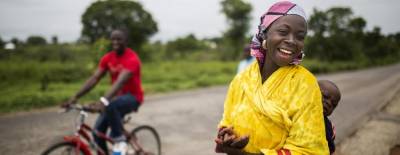The Government of Nigeria and the Global Financing Facility (GFF) announced today that the GFF, a multi-stakeholder partnership, was investing US$20 million to improve and strengthen primary health care starting in three states, with the aim of reaching the poorest and most underserved throughout the country. The Government of Nigeria is linking this investment financing to about US$150 million or NGN 55.1 billion equivalent per year from its budget, implemented as part of the Basic Healthcare Provision Fund (BHCPF) of the National Health Act. The quantum of resources and prioritization of services will contribute to sustainably financing the health and nutrition needs of women, children and adolescents.
“The Government of Nigeria is committed to ensuring that all Nigerians—particularly the women, children and adolescents facing some of the most challenging circumstances, in the most challenging places—have access to the basic health and nutrition services that they need, without becoming poorer by paying for them,” said Professor Isaac F. Adewole, Minister of Health of Nigeria.
The grant from the GFF will co-finance early implementation of the BHCPF with funds mobilized from the government and other contributors, starting in three states: Abia, Niger, and Osun. Following this start-up phase, the government will provide most of the financing for the scale-up to the remaining 33 states and the Federal Capital Territory.
“The Government of Nigeria will make an enormous difference in the lives of millions of Nigerians by making a lasting investment in the health and nutrition of women, children and adolescents, the foundation of society and the economy,” said Mariam Claeson, Director of the Global Financing Facility.
The GFF US$20 million, together with US$2 million in start-up support from the Bill & Melinda Gates Foundation, will complement the Nigerian Government’s funding for the BHCPF and help move implementation forward as quickly and effectively as possible.
The BHCPF has four priorities:
1) to finance "best buy" reproductive, maternal, newborn, child and adolescent health and nutrition interventions, as well as screening for high blood pressure and diabetes;
2) to innovate systems of delivery in primary health care that reach those with the greatest needs first—with a focus on rural areas, and a commitment to keeping services free for those who need them;
3) to improve primary health care facilities’ ability to operate effectively and with autonomy, by providing direct funding for operational expenses; and
4) to track implementation and promote continuous learning and course corrections for better results and accountability.
“Together, the Government of Nigeria, with the support of the Global Financing Facility, the World Bank, and other partners, are catalyzing real change for the people of Nigeria,” said Rachid Benmessaoud, World Bank Country Manager for Nigeria.
In the long run, the BHCPF’s success will be underpinned by the use of the Government of Nigeria’s own resources to purchase services instead of inputs; the buying of services from both public and private providers; the establishment of a system of accreditation to improve quality of care; the financing of a rigorous system of verification that helps ensure value for money; the creation of robust payment systems; and the demonstration of long-term government commitment to using public funds to subsidize the cost of services for the poor. Success will also activate the potential for the BHCPF to function as a credible and effective channel for support from Nigeria’s multilateral and bilateral donor partners.
Image credit: GFF Website

